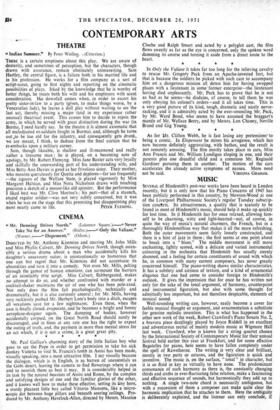CINEMA
“Mr. Denning Drives North." (Leicester Square.)---,, Never Take No for an Answer." (Rialto.)--0 Only the Valiant." (Warner.)—“ Elopement." (Odeon.) DIRECTED by Mr. Anthony Kimmins and starring Mr. John Mills and Miss Phyllis Calvert, Mr. Denning Drives North, though osten- sibly a serious drama about a man who accidentally kills his daughter's unsavoury suitor, is unintentionally so humorous that one can but regret that Mr. Kimmins did not accentuate its absurdities and turn it into a comedy. Not even Mr. Mills, pelting through the gamut of human emotions, can surmount the barriers of an inimitably trite script. Miss Calvert, flabbergasted, makes no attempt to do so, and whether confronted with murder or a cocktail-shaker maintains the air of one who has been pole-axed. Not only does the film fail psychologically, technically and dramatically, but it is also curiously amoral ; for Mr. Mills, having very recklessly pushed Mr. Herbert Lom's body into a ditch, escapes all vexations save for a few nightmares. Even these, when the case is finally closed, evaporate, and he becomes a bright and bonny aeroplane-designer again. The dumping of bodies, however accidentally corpsed, on the Great North Road should surely be discouraged, and in films at any rate one has the right to expect the outing of truth, and, the payment in more than mental stress for an act which, if it is not a crime, is a great great pity.
Mr. Paul Gallico's charming story of the little Italian boy who goes to see the Pope in order to get permission to take his sick donkey Violetta to visit St. Francis's tomb in Assisi has been made, visually speaking, into a most attractive film. I say visually because the dialogue, which is in English, is as barren of unessentials as the Gobi desert, leaving the camera to find flowerings where it can and to nourish them as best it may. It is considerably helped in its task by the natural beauties of Assisi and Rome, by the complex and satisfying designs of one and the familiar glories of the other, and it knows well how to make these effective, setting its tiny hero, a sturdy pleasant little boy called Vittorio Manunta, like a micro- scopic dot between huge pillars and beneath soaring ceilings. Pro- duced by Mr. Anthony Havelock-Allan, directed by Messrs. Maurice
•
Cloche and Ralph Smart and. acted by a polyglot cast, the film flows sweetly as far as the eye is concerned, only the spoken word damming its course and turning it aside from a direct route to the heart.
In Only the Valiant it takes far too long for the relieving cavalry to rescue Mr. Gregory Peck from an Apache-invested fort, but that is because the soldiers he picked with such care to accompany, him on a dangerous mission all detest him for having swopped places with a lieutenant in someformer enterprise—the- lieutenant having died unpleasantly. Mr. Peck has to prove that he is not as bad as he seems—he disdains, of course, to tell them he was only obeying his colonel's orders—and it all takes time. This is a very good picture of its kind, tough, dramatic and nicely nerve- racking, and it is admirably acted by the ever-unsmiling Mr. Peck, by Mr. Ward Bond, who seems to have assumed the braggart's mantle of Mr. Wallace Beery, and by Messrs. Lon Chaney, Neville Brand and Gig Young.
As for Mr. Clifton Webb, he is fast losing any pretensions*to being a comic. In Elopement he mixes his arrogance, which has now become definitely aggravating, with bathos, and the result is not remotely amusing. The film mostly takes place in cars, Miss Ann Francis and Mr. William Lundigan eloping in one, and their parents plus one dreadful child and a comatose Mr. Reginald Gardiner pursuing them in another. The motion of the cars accelerates the already active symptoms of nausea. More need






























 Previous page
Previous page